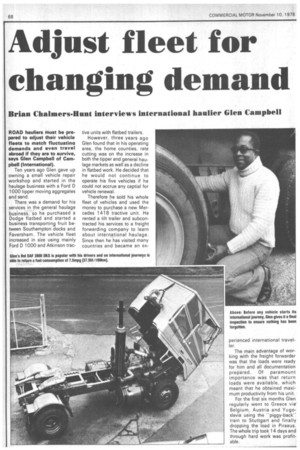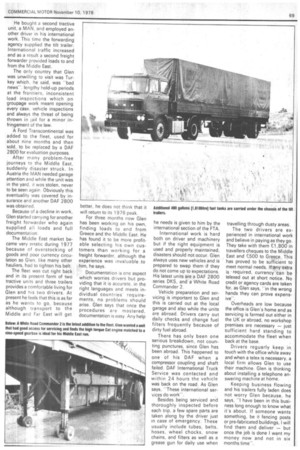Adjust fleet for changing demand
Page 72

Page 73

If you've noticed an error in this article please click here to report it so we can fix it.
Brian Chalmers-Bunt interviews international haulier Glen Campbell
ROAD hauliers must be prepared to adjust their vehicle fleets to match fluctuatina demands and even travel abroad if they are to survive, says Glen Campbell of Campbell (International).
Ten years ago Glen gave up owning a small vehicle repair workshop and started in the haulage business with a Ford D 1000 tipper moving aggregates and sand.
There was a demand for his services in the general haulage business, so he purchased a Dodge flatbed and started a business transporting fruit between Southampton docks and Faversham. The vehicle fleet increased in size using mainly Ford D 1000 and Atkinson trac
tive units with flatbed trailers.
However, three years ago Glen found that in his operating area, the home counties, rate cutting was on the increase in both the tipper and general haulage markets as well as a decline in flatbed work. He decided that he would not continue to operate his five vehicles if he could not accrue any captial for vehicle renewal.
Therefore he sold his whole fleet of vehicles and used the money to purchase a new Mercedes 1418 tractive unit. He rented a tilt trailer and subcontracted his services to a freight forwarding company to learn about international haulage. Since then he has visited many countries and became an ex perienced international traveller.
The main advantage of working with the freight forwarder was that the loads were ready for him and all documentation. prepared. Of paramount importance was that return loads were available, which meant that he obtained maximum productivity from his unit.
For the first six months Glen regularly went to Greece via' Belgium, Austria and Yugoslavia using the -piggy-backtrain to Stuttgart and finally dropping the load in Piraeus. The whole trip took 14 days and through hard work was profitable.
He bought a second tractive unit, a MAN, and employed an other driver in his international work. This time the forwarding agency supplied the tilt trailer. International traffic increased and as a result a second freight forwarder provided loads to and from the Middle East.
The only country that Glen was unwilling to visit was Tur
key which, he said, was "bad news-: lengthy hold-up periods at the frontiers, inconsistent load inspections which on groupage work meant opening every case, vehicle inspections and always the threat of being thrown in jail for a minor infringement of the law.
A Ford Transcontinental was added to the fleet, used for about nine months and then sold, to be replaced by a DAF 2800 for evaluation purposes.
After many problem-free journeys to the Middle East, suddenly disaster struck. In Austria the MAN needed garage attention and while the unit was in the yard, it was stolen, never to be seen again. Obviously this eventuality was covered by insurance and another DAF 2800 was obtained.
Because of a decline in work, 'Glen started carrying for another freight forwarder who again supplied all loads and full documentation.
The Middle Fast market became very erratic during 1977 because of overstocking of goods and poor currency circulation so Glen, like many other hauliers, had to tighten his belt.
The fleet was cut right back and in its present form of two tractive units and three trailers provides a comfortable living for Glen and his two drivers. At present he feels that this is as.far as he wants to go, because although transport to the Middle and Far East will get better, he does not think that it will return to its 1976 peak.
For three months now Glen has been working on his own, finding loads to and from Greece and the Middle East. He has found it to be more profitable selecting his own customers than working for a freight forwarder, although the experience was invaluable to him, he says.
Documentation is one aspect which worries drivers but providing that it is accurate, in the right languages and meets individual countries requirements, no problems should arise. Glen says that once the procedures are mastered, documentation is easy. Any help he needs is given to him by the international section of the FTA.
International work is hard both on driver and machinery but if the right equipment is used and properly maintained, disasters should not occur, Glen always uses new vehicles and is prepared to swap them if they do not come up to expectations.
• His latest units are a DAF 2800 series DKS, and a White Road Commander 2.
Vehicle preparation and servicing is important to Glen and this is carried out at the local garage and also while the units are abroad. Drivers carry out daily checks and change fuel filters frequently because of dirty fuel abroad.
There has only been one serious breakdown, not counting punctures, since Glen has been abroad. This happened to one of his DAF when a compressor coupling and shaft failed. DAF International Truck Service was contacted and within 24 hours the vehicle was back on the road. As Glen says, "These international services do work-.
Besides being serviced and thoroughly inspected before each trip, a few spare parts are taken along by the driver just in case of emergency. These usually include tubes, belts, hoses, wheel chocks, snow chains, and filters as well as a grease gun for daily use when travelling through dusty areas.
The two drivers are experienced in international work and believe in paying as they go. They take with them £1,800 in travellers cheques to the Middle East and £500 to Greece. This has proved to be sufficient to meet normal needs. Iflany extra is required, currency can be telexed out at short notice. No credit or agency cards are taken for, as Glen says, "in the wrong hands they can prove expensive".
Overheads are low because the office is Glen's home and as servicing is farmed out either in the UK or abroad, no workshop premises are necessary — just sufficient hard standing to accommodate the fleet when back at the base.
Drivers reguarly keep in touch with the office while away and when a telex is necessary, a local firm allows Glen to use their machine. Glen is thinking about installing a telephone answering machine at home.
Keeping business flowing and his trailers fully laden does not worry Glen because, he says, "I have been in this business long enough to know what it's about. If someone wants something, be it fencing posts or pre-fabricated buildings, I will find them and deliver — but once the job is done I want my money now and not in six months time".






















































































































































